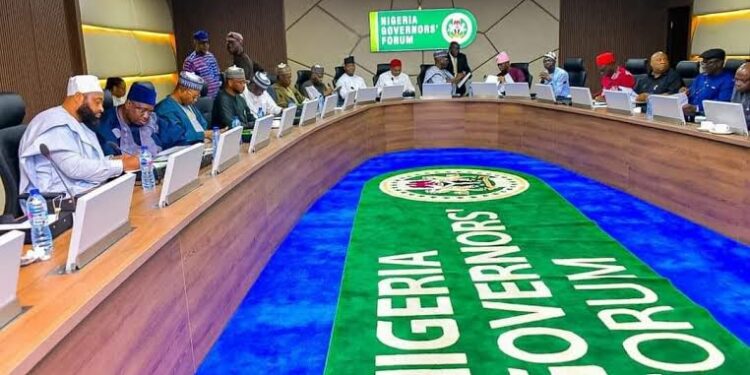About N3.87 trillion has been allocated for recurrent expenditure across 13 Nigerian states in their proposed budgets for the 2025 fiscal year.
The governors of these states have presented budgets that prioritise administrative costs, including salaries and overheads, while also allocating significant funds for capital projects aimed at boosting infrastructure development.
The total proposed budget across the 13 states for 2025 stands at N9.07tn. Of this total budget, N3.87tn is allocated for recurrent expenditure, which covers the ongoing costs of running the government and providing essential services.
The remaining N5.845tn is directed towards capital expenditure, reflecting the states’ focus on long-term projects.
The figures provided in this report were derived from details of the budget submitted by the state governors to their respective State Houses of Assembly. The reports were posted on each state’s official website.
Recurrent expenditure refers to the regular and ongoing costs that a government or organisation incurs in the day-to-day running of its activities.
Capital expenditure, on the other hand, refers to the funds used by the government or an organisation for the acquisition or construction of long-term assets that will contribute to future growth and development.
In Lagos State, Governor Babajide Sanwo-Olu proposed a budget of N3.005tn, with N1.24tn allocated for recurrent expenditure, representing a portion of the total budget. The state also earmarked N1.76tn for capital expenditure, highlighting its focus on infrastructural development.
Bauchi State Governor, Bala Mohammed, presented a N465.09bn budget, with N182.74bn allocated for recurrent expenditure, which makes up 39.3 per cent of the total budget. The remaining N282.34bn is set aside for capital expenditure, underscoring the state’s commitment to development.
In Bayelsa State, Governor Douye Diri proposed a N689.4bn budget with N263.38bn earmarked for recurrent expenditure, accounting for 38.2 per cent of the total budget. A larger portion, N404.76bn, was allocated for capital expenditure.
Osun State Governor, Ademola Adeleke, presented a N390.03bn budget, allocating N245.8bn (62.9 per cent) for recurrent expenditure, with N144.23bn dedicated to capital expenditure.
Oyo State’s budget, presented by Governor Seyi Makinde, is N678.09bn, with N325.57bn allocated for recurrent expenditure. This represents 49.41 per cent of the total budget. The state has also proposed N349.29bn for capital expenditure.
Anambra State Governor, Charles Soludo, presented a N606.9bn budget with N139.5bn allocated for recurrent expenditure, representing 23 per cent of the total. A larger share of N467.5bn is dedicated to capital expenditure, though the state faces a projected deficit of N148.3bn.
In Gombe State, Governor Muhammadu Yahaya proposed a N320.11bn budget, allocating N111.09bn for recurrent expenditure and N209.02bn for capital expenditure.
Ekiti State Governor, Biodun Oyebanji, presented a N375.7bn budget, with N192.3bn (51 per cent) allocated for recurrent expenditure and N183.4bn (49 per cent) for capital expenditure.
Additionally, Cross River State Governor, Bassey Otu, presented a N498bn budget, with N170bn allocated for recurrent expenditure, representing 34 per cent of the total. The bulk of the budget, N328bn, is focused on capital expenditure, aimed at supporting infrastructure growth.
In Akwa Ibom, the state’s executive council approved a N955bn budget, with N300bn set aside for recurrent expenditure and N655bn for capital projects. This was disclosed in a statement issued by the state Commissioner of Information, Ini Ememobong after the council’s meeting presided over by Governor Umo Eno, on Wednesday.
Delta State Governor, Sheriff Oborevwori, presented a N936bn budget, allocating N348bn for recurrent expenditure and N587bn for capital expenditure.
Governor Caleb Mutfwang of Plateau State presented a budget estimate of about N471.1bn to the State House of Assembly for the 2025 fiscal year on Monday. In Plateau State, Governor Mutfwang proposed a N471.1bn budget, with N201.5bn allocated for recurrent expenditure, representing 43.46 per cent of the total budget. The capital budget estimate is N258.8bn, representing 56.54 per cent of the total budget.
Governor Dikko Radda of Katsina State on Monday presented the State’s 2025 Budget Proposal to the state House of Assembly. Katsina’s recurrent expenditure stands at N157.97bn, representing 23.15 per cent of the total budget, while capital expenditure is N524.27bn, representing 76.85 per cent of the budget.
Commenting, the Chief Executive Officer of Cowry Treasurers Limited, Charles Sanni, shared his insights, “The huge budgeted recurrent expenditures speak to the fact that little is available for capital projects. This will lead to capital investment rationing. A low capital expenditure budget simply tells us that not much growth and contribution to GDP will be expected because only significant capital budgets will promote economic, human, and social investments.”
He further suggested two primary options for improving the financial health of the states: “Cost optimisation—stop leakages, adopt strict budget control measures, and cut down on the size or cost of personnel, particularly political aides—and increasing internally generated revenue through more public-private partnership deals, multilateral organizations’ direct budget financing support, and diaspora engagement for special projects funding.”
An economist and investment specialist, Vincent Nwani, also weighed in, by stating that “the budget is small; some Nigerian universities’ annual budgets are even larger. It is too small for any significant development, and for infrastructure, it is still a small amount.
“What’s worse is that a large portion of the capital is being used for non-productive purposes, such as buying cars, instead of funding long-term projects that can drive economic growth. There are issues of corruption and a lack of transparency that need to be addressed. The states need to start generating more income to meet their obligations, as they have borrowed before and need to repay.”
The TheNigerian reports that economic stakeholders have projected that the 2025 proposed budget of N47.9tn may underperform due to its bullish assumptions.

